The Group of Seven industrial democracies at their annual summit in August should have agreed to urge China to recognize Hong Kong’s high-level autonomy as promised earlier and avoid violence to put down Hong Kong citizens’ massive protest rallies. The British government has issued its foreign secretary’s statement condemning the China-backed Hong Kong police’s live firing at a protester. The U.S. House of Representatives has unanimously passed a bipartisan bill to back up Hong Kongers’ demand for democratization. However, the Japanese government has remained indecisive on the matter, failing to criticize Hong Kong authorities or their backer China for suppressing protesters. At the Japanese National Diet, no moves have been seen regarding the Hong Kong issue, either. Has Japan become an extraneous country among the Western industrial democracies?
Britain spearheads criticism against crackdown
Among the G7 countries, Hong Kong’s former colonial ruler, Britain, has been the most sensitive to the crackdown on Hong Kong rallies. Immediately after a high school student protester was seriously injured with live rounds fired by Hong Kong police on October 1, Foreign Secretary Dominic Raab of the Johnson administration, set up in late July, issued a statement saying, “the use of live ammunition is disproportionate, and only risks inflaming the situation.” On October 4, when Hong Kong authorities took an emergency measure to ban protesters from wearing face masks, the foreign secretary released another statement, saying that authorities “must avoid aggravating and instead reduce tensions.”
At the late August G7 summit he hosted, French President Emmanuel Macron included a sentence in the Leaders’ Declaration he compiled saying, “The G7 reaffirms the existence and importance of the Sino-British Joint Declaration of 1984 on Hong Kong and calls for violence to be avoided.” The joint declaration said that Hong Kong’s social and economic systems differing from those of China would remain unchanged and that Hong Kong residents’ basic human rights and freedoms would be ensured. Given that the Armed Police of the Chinese People’s Liberation Army were assembling in Shenzhen bordering Hong Kong at that time, “violence” in the G7 statement was interpreted as China’s potential military intervention.
As a matter of fact, U.S. President Donald Trump has been cold-hearted toward Hong Kong protests. U.S. and British news media have even reported that President Trump promised Chinese counterpart Xi Jinping that the U.S. government would remain silent on Hong Kong as part of a deal to settle the U.S.-China trade war and banned Trump administration officials from making comments supporting Hong Kong protesters.
However, the U.S. Congress’s proactive engagement in Hong Kong has blown away President Trump’s coldness. The Hong Kong Human Rights and Democracy Act of 2019, passed by the U.S. House, would require the State Department to submit an annual report to the Congress on the degree to which Chinese government actions have eroded Hong Kong’s autonomy.
Japan’s Diet should learn from U.S. Congress
Japanese Chief Cabinet Secretary Yoshihide Suga has kept his comments on Hong Kong virtually unchanged over the past two months, reiterating (1) that the government is gravely concerned about a rising number of people injured in Hong Kong and (2) that the government strongly hopes the protests would be resolved early through peaceful talks between parties concerned and maintain Hong Kong’s stability
Some officials in the ruling Liberal Democratic Party think that the Japanese government is taking great care not to arouse China in order to smoothly receive Xi who plans to visit Japan next spring as a state guest, according to the Yomiuri Shimbun newspaper. Superficial Japan-China friendship might have become a priority for both the Japanese government and legislature.
Yasushi Tomiyama is a senior research fellow and Planning Committee member at the Japan Institute for National Fundamentals and a former foreign news editor and bureau chief in Washington, D.C., London and Bangkok for the Jiji Press.


